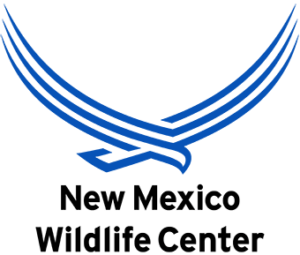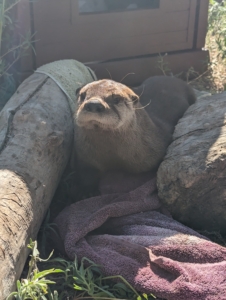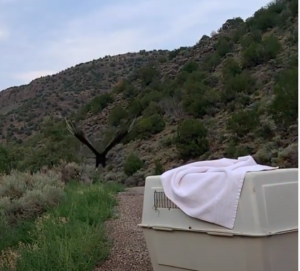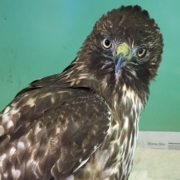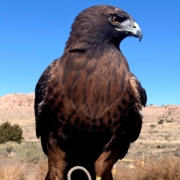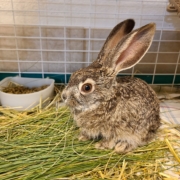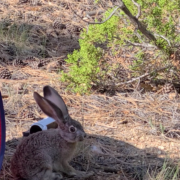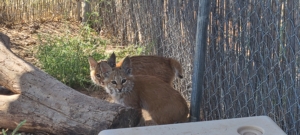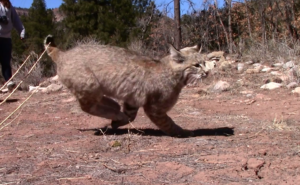North American River Otter 23-178 in pre-release
North American River Otter 23-178
Turkey Vulture 21-104 flying off after release!
Turkey Vulture 21-104
The Story of Cinder
Red-tailed Hawk 18-652 came into our wildlife hospital on December 14, 2018. Multiple people had called NMWC to tell us about a hawk on the side of the road of Southbound Interstate-25. Someone was finally able to get it into a box and hand it off to one of our transporters in Santa Fe.
Once she arrived at our wildlife hospital, our wildlife rehabilitators, Haley and Hilary, assessed her condition. She had classic signs of head trauma from an impact; her left eye was swollen shut, she had blood in her mouth, and she was unsteady on her feet.
Luckily with anti-inflammatory and pain medications, her condition started to improve. The wildlife rehabilitators were pleased with her progress until they started noticing that she would only look at them with her right eye. At her next vet check-up it was discovered that her left iris had fused to the cornea and she was completely blind in that eye.
For most birds this would have been the end of her time at the New Mexico Wildlife Center. A red-tailed hawk cannot survive in the wild with only one eye and we would have had to make the difficult decision to euthanize.
But our rehabilitators had another idea in mind. She was still in her first year of life, her tail feathers were still barred and not the iconic red, and she was adapting well to being in captivity. After Executive Director Melissa and Education Animal Curator Shawna met Cinder, it was determined that she would be a perfect addition to our Ambassador Animal Team!
NMDGF gave us permission and she became the newest Animal Ambassador. After a few months of training she moved into her new mew on the DePont Family Wildlife Walk and you can now visit her anytime from 9-4 Monday-Saturday.
Cinder in 2018 after arriving at our Wildlife Hospital.
Cinder in 2020 out for an educational program.
The Jackrabbit after entering our wildlife hospital on July 28, 2020.
The Jackrabbit on August 27, 2020 during release.
Black-tailed Jackrabbit
Black-tailed Jackrabbit 20-600 came to our wildlife hospital as an infant on July 28, 2020 after being found and picked up by a dog on a hiking trail. After our rehabilitators performed a thorough exam, it was determined that this jackrabbit did not sustain any of the punctures, fractures, or cuts that are often seen with dog bites. We commonly get in wildlife that is severely damaged due to being caught by domestic dogs or cats, so this jackrabbit was extremely lucky.
He was placed in an inside space and provided formula specific to jackrabbits and gradually transitioned to hay and greens. Once our hospital staff was certain he was eating on his own, he was moved to an outside enclosure. After about a month in our wildlife hospital, it was determined that this jackrabbit leveret (a term for young hares) was ready to be released. He was released on August 27, 2020 in Santa Fe.
This was an especially exciting success story as jackrabbits are notoriously difficult to rehabilitate due to their high stress. Our wildlife hospital staff took extra precautions to minimize any stress, loud noises, and movement when caring for this jackrabbit. All of their hard work paid off when they watched him run out of his transport crate and into the wild.
To help support our wildlife hospital rehabilitate wildlife like this jackrabbit, visit our donation page.
Three Bobcat Kittens Grow Up
In September 2020, our wildlife hospital received three young bobcat kittens that had been orphaned. When the kittens arrived at our hospital in September, they were the size of kittens that we usually receive near the end of June. Even though they were very small for that time of year, they were all healthy and quite feisty. They grew quickly and were moved into the large predator cage at the end of November.
After six months in our care, they were successfully released back into the wild on March 17 into the Jemez mountains with NMDGF officers. The bobcat kittens consumed an enormous amount of meat while in our care and we are so appreciative of everyone who donated to our hospital during their stay. We are always looking for game meat donations for our hospital patients as well as for our Ambassador Animals.
